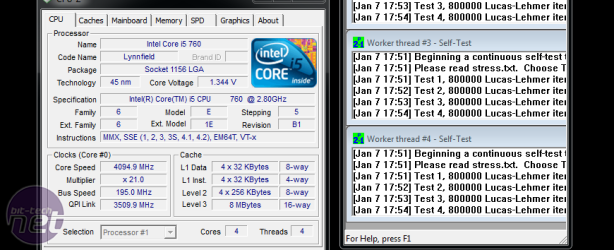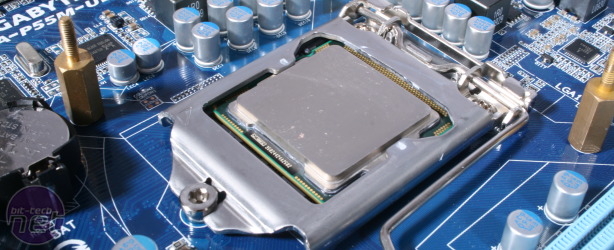Core i5-760 Performance Analysis
Performance-wise, the i5-760 was a surprisingly mixed bag. It fared well against its most closely priced AMD competitor, the Phenom II X4 970 Black Edition. At stock speeds for example the i5-760 pulled out a lead of 140 points in our Media Benchmarks, despite running 700MHz slower than the AMD chip. Crysis also seemed to prefer the Intel chip, with our test rig managing a 27fps minimum with the i5-760 inserted against the 23fps minimum we saw when using the X4 970.These gaps increased when both the chips were overclocked too; with both chips running at 4.1GHz, the i5-760 was a staggering 35 per cent faster than the X4 970 in our Media Benchmarks. At these speeds, the i5-760 took the lead in every one of our tests, including those that the X4 970 had proved dominant in at stock speeds such as our Cinebench and WPrime tests.
With the competition from AMD comprehensively destroyed, we set about seeing how the i5-760 compares with its forebear, the i5-750. Surprisingly, we found the i5-760 a few points behind the i5-750 in nearly every test at stock speeds, with only Cinebench giving the more recent CPU the advantage. This was puzzling, especially as the i5-760 runs at a higher clock speed and no doubt has had a number of tweaks applied to it (despite being on the same core stepping).
When we investigated, we found that the i5-760 wasn’t using its Turbo Boost (rev 2) technology as well as the i5-750, and as a result, the chip ran more slowly in lightly threaded applications. The i5-760 is supposed to be able to increase its multiplier by five steps, but we saw it increase by only one. This meant that while the old i5-750 hit 3.2GHz, the i5-760 only rose to 2.93GHz at the most. This occurred even when running the latest BIOS on our test board and making sure that Turbo Boost and all related technology (such as C6 Sleep support) was enabled.
Fortunately, Turbo Boost (rev 2) should be disabled when overclocking, so once we'd bumped our test i5-760 up to its air cooled maximum of 4.1GHz it opened up a small gap between it and the i5-750, which we could only get up to 4.0GHz. The gap was only small though, with only 50 points separating the two chips in our media benchmarks. Gaming was a different story though as the i5-760 opened up a not inconsiderable lead of 4fps in our Crysis play through. Strangely the i5-760 couldn't overturn the i5-750 in WPrime 32M test though, consistently lagging behind the 8.229 seconds we saw from the overclocked i5-750.
Possibly the area that surprised us the most was the power consumption figures that we saw from our test i5-760. On average, our test rig drew 22 per cent less power from the wall with the i5-760 installed than with the i5-750 installed. This is a large difference but we ran our tests a number of times to check for consistency and we saw these figures repeatedly.
There could be a number of factors affecting this result, the most likely of which is that Intel has tweaked the power management systems of the i5-760 to make the chip more frugal with its power usage. CPU manufacturers tweak and adjust die designs all the time, especially as manufacturing lines and processes mature, and become more proficient at producing higher yields of chips.
Another factor that could be affecting the figures at stock speed is the fact that the i5-760 wasn't Turbo Boosting properly during testing, meaning that at times it was running slower than the i5-750. Finally, it's possible that we simply received a chip that was particularly efficient; we noticed the stock vcore of 1.13V at which the chip ran was notably low. Each chip is unique and will need different voltages applied to it to achieve a given clock speed; this is why we always say that your mileage may vary when overclocking.
Conclusion
There’s very little to dislike about the i5-760, as it’s essentially a slightly faster i5-750 for the same price. The only disappointment was that Turbo Boost (rev 2) didn’t work as well as we’d expected, producing only a 133MHz increase rather than the claimed 665MHz boost.We suspect that microcode BIOS updates will iron out this minor issue (we tried the same CPU in a couple of other boards with the same result, so it appears to be an industry-wide concern at the moment), and it affects only those who run their CPUs at stock speeds. Running the i5-760 at stock speeds, however, is a travesty, as the Intel Core i5-760 is as epically overclockable as its forebear.
Obviously, the i5-760 doesn't represent a massive leap forward (anyone with an i5-750 needn't bother upgrading) but it doesn't really need to. It's a very overclockable chip that costs the same as its lower-clocked predecessor. Need we say more?
- Speed
- x
- x
- x
- x
- x
- x
- x
- x
- -
- -
- 8/10
- Features
- x
- x
- x
- x
- x
- x
- x
- x
- x
- -
- 9/10
- Value
- x
- x
- x
- x
- x
- x
- x
- x
- x
- -
- 9/10
- Overall
- x
- x
- x
- x
- x
- x
- x
- x
- x
- -
- 9/10

Intel Core i5-760

MSI MPG Velox 100R Chassis Review
October 14 2021 | 15:04











Want to comment? Please log in.